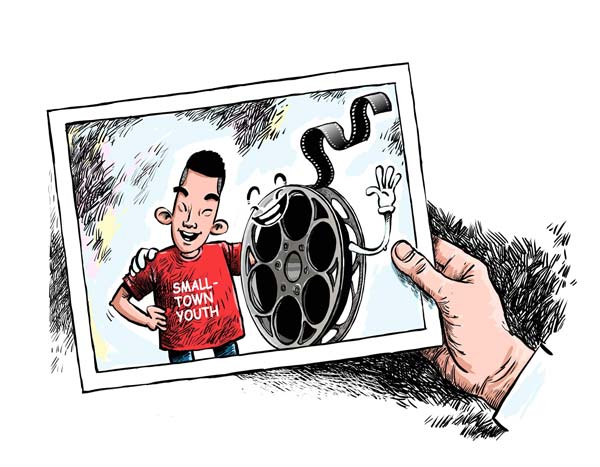 |
| (China Daily/Pang Li) |
Opinion leaders like critics may have the final say in the appraisal of a film, but it is the young in provincial cities that increasingly determine the box-office results in the Chinese market.
The boom in China's film market has been quietly shifting from the metropolises to slightly smaller cities — smaller by Chinese standards — with a growing impact on both domestic and imported films and their financial performances.
As late as 2009, Beijing, Shanghai, Guangzhou and Shenzhen accounted for 34.3 percent of the Chinese mainland's box-office revenue. But their share has been slipping year by year, dipping to 25.8 percent last year, says EntGroup, an industry research firm. The market in first-tier cities, which also include Chengdu, Wuhan and Chongqing, has been saturated, and new movie theaters are sprouting up in second- and third-tier cities.
The seven first-tier cities still account for nearly 48 percent of all box-office grosses, but the trend is clear: The days when they commanded more than half the market are gone forever.
China is expected to have 18,000 screens by the end of this year, and of the 3,832 screens added last year, about 60 percent were outside first-tier cities. In 2002, China had 1,800 screens, which was about 5 percent of the number in the US. (By screens we mean those in modern, air-conditioned multiplexes, not the old-style multi-purpose auditoriums.) Now, we have climbed over the halfway point in catching up with the US, and the forecast for 2015 is 30,000 screens.
The Chinese media have given a special name to the audience in second- and third-tier cities: "small-town youth". It is a mild put-down, but then even the majority of those who now work in metropolises hail from smaller hometowns. So, the term is somewhat self-deprecating.
This demographic has just been discovered. Their exposure to movies was through pirated disks and online streaming. The experience of sitting in a dark room with state-of-the-art sound and projection technologies and paying for it has been foreign to them. Some new theaters have to resort to deep discounts to entice them. But once they get a taste of this experience, they seem to love it, to the point that they are filling theaters faster than real estate developers and exhibitors can build them.
Small-town youth is a force to be reckoned with, not only in pure numbers, but also in the choice of movies. Frankly, they are not known for being sophisticated. Movies such as Les Miserables or Anna Karenina may not have much attraction, because the fact that they are adapted from literary classics can be a turnoff. In January, when The Grandmaster was drawing big crowds and setting off fireworks of debate in places like Beijing, Wong Kar-wai's martial arts extravaganza was losing to a little comedy called Bring Happiness Home in provincial cities. The latter was not even a good comedy, but it features a cast of popular television hosts.

 Fire guts 22-storey Nigeria commercial building in Lagos
Fire guts 22-storey Nigeria commercial building in Lagos U.S. Navy Carrier Strike Group stages military exercises
U.S. Navy Carrier Strike Group stages military exercises Volkswagen showcases new energy vehicles in Beijing
Volkswagen showcases new energy vehicles in Beijing  A girl takes care of paralyzed father for 10 years
A girl takes care of paralyzed father for 10 years A record of Beijing air quality change
A record of Beijing air quality change In pictures: explosions occur in Taiyuan
In pictures: explosions occur in Taiyuan Hello! Horror Halloween Celebration!
Hello! Horror Halloween Celebration!  The catwalk to the world of fashion
The catwalk to the world of fashion  Cruise trip to Taiwan
Cruise trip to Taiwan  Unveil PLA air force base
Unveil PLA air force base  Loyal dog waits for master for six months
Loyal dog waits for master for six months Oriental education or western education?
Oriental education or western education? China in autumn: Kingdom of red and golden
China in autumn: Kingdom of red and golden National Geographic Traveler Photo Contest
National Geographic Traveler Photo Contest Chinese screen goddesses from Beijing Film Academy
Chinese screen goddesses from Beijing Film Academy Day|Week|Month